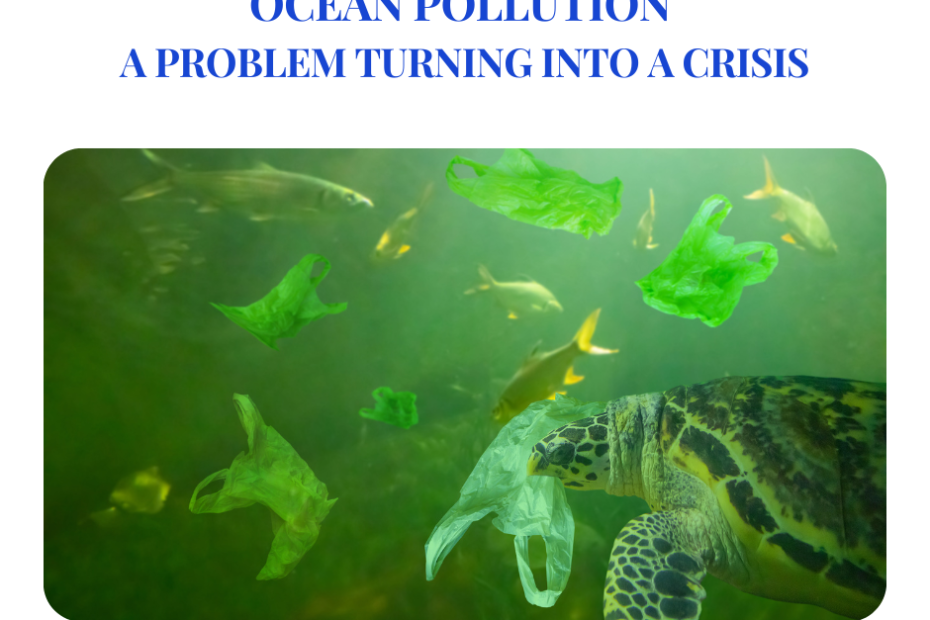The growing population, and demand for high economic growth, have created huge stress on our natural resources. Fast development, rapid urbanization, and technological advancement have undoubtedly raised our quality of life. Still, at the same time, they have bought a humungous burden on our natural resources and ecosystem. These days climate change, environmental degradation, biodiversity loss, pollution, piling mountains of waste, etc., are commonly discussed. Many reasons have given rise to these problems, like intensive usage of fossil fuels, unplanned development, deforestation, and waste generation. However, each of these is playing its part in the deterioration of the Earth’s ecosystem, but immense waste generation and its mismanagement and haphazard dumping have worsened and even expedited the environmental degradation. Most of the waste generated either end up in overflowing landfills or, unfortunately, in our oceans.
Ocean pollution is gradually becoming a crisis now at the global level. Our vast oceans are getting polluted day by day due to various human activities. Waste and pollution reach oceans through rivers, run-offs, and direct dumping in the oceans. There is already so much waste dumped into the sea that it has formed giant garbage patches. The most prominent garbage patch lies in the great pacific, known as the Great Pacific Garbage Patch, which is estimated to have endless pieces of floating plastic trash. Researchers speculated that if the same scenario continues, the amount of plastic will soon outweigh the ocean fish.
The pollutants found in the ocean are mainly plastics, industrial waste, heavy metals such as mercury, cadmium, chemicals released from pharmaceuticals, urban waste, fertilizers, pesticide run-off, heavy oils, petroleum, sewage, or waste water from waste treatment plants, etc. All this pollution is creating havoc on aquatic/marine life. Because of consuming toxic chemicals and plastics, many fishes, turtles, and seals die a grim death. Photographs of turtles or seals entangled in discarded nets, ropes, and plastics flood the internet and show the gruesome reality. Apart from this, oil or petroleum spills damage the gills of fish that eventually die because of suffocation.
No doubt that this kind of pollution is causing a severe threat to marine life, but it also impacts the health and well-being of humans. Due to the continuous wave action and sun, plastic breakdown into tiny particles of size less than 5mm, called microplastics. These microplastics contain many toxic chemicals that were added to provide flexibility, colour, and water-resistant properties. All this waste, microplastic heavy metals, and toxins are entering the ocean food chain and eventually in our bodies. These chemicals are known to be carcinogens, hormone disruptors, neurotoxins, etc., that cause cancer, birth defects, reduced fertility, and other deadly diseases.
It is crucial to reduce ocean pollution to save marine life and our well-being. Many organizations are working towards cleaning up the sea, but we need to be proactive and take measures to curb further ocean pollution. This requires strong policies and cooperation at the national and international levels. Banning single-use plastics, effective waste management, especially for plastic and e-waste, prohibition of toxic chemicals usage in plastic products, and moving towards a circular economy can bring unprecedented change. Also, at the individual level making simple behavioral changes like practicing conscious consumerism, refusing plastics, waste sorting, and living sustainably can bring the much-needed transformation. This will not only help in curbing ocean pollution but also environmental degradation as a whole.
https://www.texasdisposal.com/blog/ocean-pollution-causes-effects-and-prevention/
https://theconversation.com/why-ocean-pollution-is-a-clear-danger-to-human-health-152641
https://www.marinebio.org/conservation/ocean-dumping/
https://www.conservation.org/stories/ocean-pollution-11-facts-you-need-to-know
https://www.biologicaldiversity.org/campaigns/ocean_plastics/
